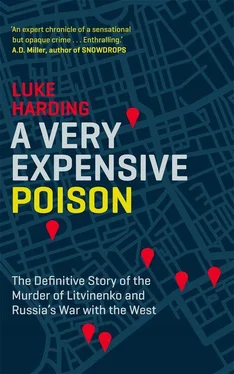At 4 a.m. that night, I was woken by a loud beeping from next door. I turned on the light, and groped towards the sound. An alarm clock with a digital display was ringing in the living room. I hadn’t set the alarm. We’d inherited the clock from our landlord, Vadim, but never used it. It appeared my intruders had decided to play a sinister prank on us. Evidently, this wasn’t a conventional burglary. I checked the kitchen. I’d left several thousand dollars in a drawer to pay next month’s rent. The cash was still there.
Putin’s secret policemen were carrying out a different mission: to intimidate and scare us. Berezovsky, Litvinenko’s polonium murder, the FSB’s secret poison factory – all these were apparently taboo themes. I had crossed a line. There would be further break-ins, and further warnings.
Shortly before this covert harassment started, I attended Putin’s annual press conference. The venue was a giant two-tiered auditorium inside the Kremlin. This was a remarkable set-piece event – attended by 2,000 mostly Russian journalists and screened live on state television. They shouted softball questions. What did the president think about gardening? How should Russians bring up their kids?
Putin was also asked about Litvinenko. His dismissive response: that Litvinenko was a small-time agent who’d been fired from the FSB for beating up suspects and who ‘didn’t possess any secrets at all’.
In May 2007, the UK’s Crown Prosecution Service charged Lugovoi with Litvinenko’s murder. This, from Putin’s perspective, was another provocation. He refused Britain’s request to hand over Lugovoi. Putin said that Russia’s constitution forbids the extradition of its citizens. The request was a sign of Britain’s ‘arrogance’ and a ‘no brains’ colonial mentality, he added.
In the wake of the CPS’s charge, Lugovoi held a press conference. It took place in the Moscow office of the Russian news agency Interfax. This was the same room where in 1997 Litvinenko had accused the FSB of ordering him to snuff out Berezovsky. A photo of the famous event hung on a wall in the corridor. It was a hot day; I turned up in shorts. The room was full. Lugovoi walked in with Kovtun. Lugovoi was wearing a grey pinstriped suit and pink tie. Kovtun’s hair had grown back. Lugovoi began with a polite ‘Good afternoon, ladies and gentlemen.’
He said he’d called a press conference to defend himself from swirling accusations made by the ‘western mass media’. They had initiated ‘a real war against me and against Russia’, he said.
What followed was a lengthy denunciation – of Berezovsky, MI6 and the UK government, which had ‘hidden traces of the crime’ and ‘made me a scapegoat’. Lugovoi said that MI6 had tried to recruit him. He wasn’t a murderer, or as he put it: ‘Some Russian James Bond, infiltrating a nuclear centre and poisoning his mate in cold blood, contaminating himself, his wife and children along the way!’
Vesti-24, the state-owned TV news channel, broadcast this live. According to Lugovoi, British intelligence had murdered Litvinenko, one of its agents.
This was a serious allegation. I asked Lugovoi if he had any proof.
Lugovoi replied: ‘ Yest! ’ – There is proof!
So what was it?
Lugovoi didn’t offer details.
My question had annoyed him.
He said: ‘The British public must take a serious interest in what some Russian-born people are doing in the UK. They are engaged in recruiting Russian citizens, they sell British passports. The British nationality is for sale, esteemed BBC … sorry I don’t know what other English mass media companies are present here. Your nationality is sold like Chinese rags in a market, and you are doing nothing about it whilst thigh-slapping! I do apologise for the rough expression.’
Afterwards, the Kremlin announced that Lugovoi’s vague accusations – clearly based on talking points supplied to him by others – were worthy of ‘further investigation’.
Later that day, Britain’s ambassador to Moscow, Tony Brenton, sent off a confidential eGram – a diplomatic telegram – to the foreign office in London. Brenton summarised Lugovoi’s claims, noting that Kovtun ‘was present but said little’.
He concluded: ‘Lugovoi’s story sounds like nonsense to us, but is shrewdly judged for its plausibility to Russian ears – particularly in view of the “rock” incident last year. The fact that he was given nearly two hours on a government news channel to make his allegations strongly suggests official involvement in the stage management of his “revelations”.’
Britain’s security agencies compiled their own report on the murder, based on police evidence and secret sources. Its contents have not been divulged. The conclusion, it appears, is that this was a Russian state-sponsored assassination – not just an unfriendly act, but one involving dangerous nuclear material, which potentially endangered hundreds of lives.
In July 2007, the new UK foreign secretary, David Miliband, expelled four Russian diplomats from London. This was in protest at Moscow’s refusal to hand over Lugovoi. Miliband told parliament he believed the FSB was involved. He severed cooperation with the Russian spy agency and introduced a new visa policy for Kremlin politicians travelling to London. Up until this point MI6 had communicated with the SVR, its Russia’s foreign-intelligence counterpart. These channels were cut as well, even though the SVR was apparently not involved in Litvinenko’s poisoning, an FSB operation.
The Kremlin’s response was comparatively restrained. It expelled four diplomats in turn from the UK embassy in Moscow.
The mood among British diplomats based in Moscow was understandably embattled. They found themselves at the front end of the worst stand-off in relations since the Brezhnev era. Brenton held regular breakfast briefings for journalists. The ambassador’s residence was just off the Old Arbat – a nineteenth-century building in Bolshoi Nikolopeskovsky Lane that had once belonged to a merchant or senior official.
Brenton admitted that the Litvinenko case made better relations with Moscow impossible and said that there was no prospect of an early meeting between Putin and Gordon Brown, the UK’s new prime minister. ‘I don’t know what happens next. Lugovoi remains a wanted man,’ Brenton said. Lugovoi’s support came from the top and from ‘quite influential chunks of the Russian state’, he said, adding: ‘This guy is a suspected murderer. In normal places you don’t find a government giving support and encouragement to such a person.’
It was the use of a radioactive nucleotide that convinced the UK government this was a Kremlin plot, Brenton said. ‘Our private judgement is that you have to be a state or state organisation to get hold of polonium in the quantities it was used.’
The day after Litvinenko’s death, Lugovoi and Kovtun had visited the British embassy. They met Brenton’s deputy Sian MacLeod and his security officer David Chitty. The two Russians insisted they had nothing to do with the murder – and signed declarations to that effect.
Subsequently, the room was tested for contamination. Scientists picked up traces of polonium. The highest readings came from Kovtun’s chair – four to five becquerels per centimetre squared. They found it at the table in front of which Kovtun had been sitting, and in the storage hole where he’d left his mobile phone. ‘He sat in a chair. We had to burn the chair,’ Brenton said.
Actually this wasn’t quite true. Embassy staff locked the conference room used by Lugovoi and Kovtun, with the chairs still in it. Only a small number of diplomats knew about the radiation. Paul Knott, the embassy’s second secretary, told his colleagues the room wasn’t available because he’d ‘lost the key’. The atmosphere at the time was ‘sort of Le Carré’, he said, adding: ‘We had that Cold-War-is-here-again feeling. We knew things were worsening. But to do what they did in the heart of London seemed to us incredible.’
Читать дальше












